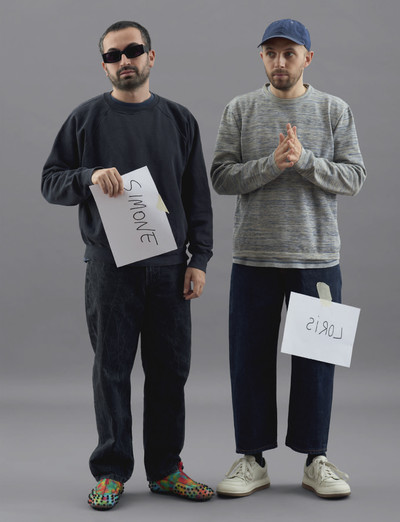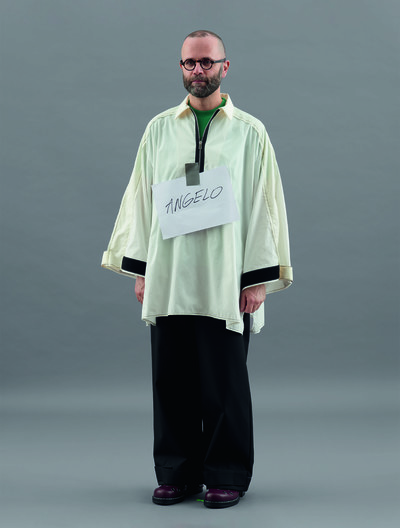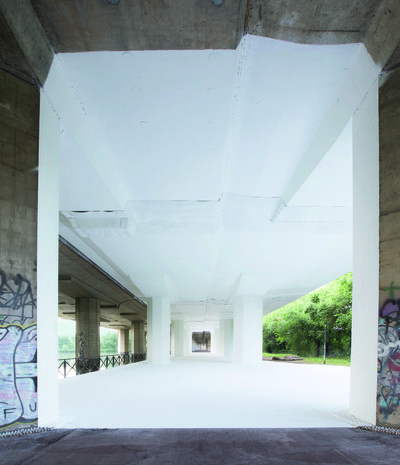Italian duo Sunnei are the fiercely non-Milanese brand from Milan with the kindergarten-for-adults aesthetic.
Interview by Angelo Flaccavento
Photographs by Andrea Artemisio
Italian duo Sunnei are the fiercely non-Milanese brand from Milan with the kindergarten-for-adults aesthetic.

I first met Simone Rizzo and Loris Messina in spring 2015 after being intrigued by a bunch of boldly striped combinaisons I had seen online. At that time, their label Sunnei was barely a year old and nobody in Milan knew that it was based in the city. Today, it remains fiercely non-Milanese in its kindergarten-for-adults aesthetic – the closest comparison being Marni’s rave-y heyday – and even correctly pronouncing its name is still a challenge. (Quick lesson: it’s sunny, but pronounced how an Italian pretending to speak good English would say it, sunn-hey.) Loris and Simone – the two kids whose angel faces and small frames put them in the ‘forever young’ category of adults – immediately struck me with their focus and determination. Their neophyte status and lack of professional training that distanced them from any ‘young designer’ cliché also reinforced that first good impression. It was clear that they were more interested in building a brand that could be a cultural and creative container rather than producing anything remotely trendy. In devising simple, yet playful clothes that they themselves wanted to wear, and communicating about them with a certain sardonic wit, Rizzo and Massina soon attracted a transversal, international coterie of like-minded peers, most of them non-fashion.
Since that first meeting, I’ve chatted with the pair regularly and watched as Sunnei has grown both its reputation and its business. In September 2020, that initial success was confirmed with a €6 million investment by Vanguards, the fashion and lifestyle investment fund co-founded by Nanushka chief executive Peter Baldaszti. The cash injection has given Sunnei room to grow, yet the more this happens, the more the designers cling to their outsider status. Proud of their highly idiosyncratic approach to business, Loris and Simone like to do things the wrong way, which has clearly hit a nerve. In its new headquarters in the calm Città Studi area of Milan, Sunnei is even more isolated from the local fashion scene than before. Even after meeting Loris and Simone so many times, I still can’t quite decide if they’re mean or nice, but I’m absolutely certain of one thing: they know exactly where they’re going.
Angelo Flaccavento: How did Sunnei come into being?
Simone Rizzo: It was kind of a swerve. We were fresh out of university, doing little jobs here and there. Loris was at Gucci; I had worked as a buyer for a couple of years. We said, ‘Let’s do something that’s ours’ – but we had no idea how to go about it.
Loris Messina: It was spontaneous and uncomplicated. In the beginning, the only question we asked ourselves was: ‘Why are there new brands everywhere except Italy?’ Something was really missing in menswear.
Simone: We decided to behave as if Sunnei had always existed, so if someone saw it for the first time, they would think that it has always been around. We started shooting with friends, like [photographer] Andrea Artemisio; luckily, they became big names in the creative world. The trouble was, we had no idea how to make clothes.
How did you build a brand that anyone can wear without the training that most fashion designers go through?
Loris: Intuition. Our first concepts were really basic. We wanted to make a white shirt, so we made one. We said, let’s do a denim one, and we did, although I didn’t even know how denim was structured. That’s how we began. We didn’t even know what cutting shears were. The collections arose out of what we wanted to wear at that point, what we wanted cool people to be wearing.
My impression is that, at least at first, fashion with a capital F wasn’t your main goal.
Simone: We launched ourselves into making clothes without having rules. Other designers were shocked by the crudeness. After a few years, we realized that we’d been lucky to start off knowing nothing. We didn’t know the rules, so we weren’t subject to strictures.
When did you understand Sunnei’s potential for bringing people together?
Simone: We did an event during the 2016 Salone Mobile with Apartamento magazine, and suddenly everyone was there – Max Lamb, Sabine Marcelis – and everyone told us, ‘You’re our reference point.’ How did that happen? We weren’t a deliberate community; it was just our circle of friends. We weren’t milanesi from Milan. The truth is that in Milan we’ve always been in our own world.
Do you deliberately distance yourselves from the Milan fashion system?
Simone: Yes, because it’s these neverending discussions about what is the story, what is beautiful. We weren’t interested. For the first three years, we worked hard on our ideas. We didn’t get much feedback, but we were OK with that because we’d met people we were totally at ease with, who were interesting, and, increasingly, business focused.
Loris: We had conviction in what we were doing because we had validation, like when Opening Ceremony bought our second season right off the bat. We said no a lot, too. There were projects coming from the commercial fashion world, but they made no sense to us.

‘It was clear that they were more interested in building a brand that could be a cultural container rather than producing anything remotely trendy.’
In this system, sometimes whoever is helping you out gets more attention than you do.
Loris: We wanted to focus exclusively on what we were doing. You have to have total conviction in your own ideas. And of course, there are two of us, so we complement each other.
Simone: If he’s down, I’m up; if he’s up, I can be down.
What’s the work dynamic between you two? Do you have roles? One of you is the creative, one is the strategist?
Simone: Loris is mega-rational, sophisticated; he sees beyond the moment. Whereas me, I’m, I don’t really know… I’m more spiritual, more communicative, more open; he is more closed off. But over the years we’ve found a good balance. I’m much more commercially minded. We can be in the same room, look at the same thing, and he sees it from one angle, me from another, and we find ourselves in the middle.
So how did you arrive at your particular design language? Because there is one: the stripes, the precise rhythm, the use of colour, the shapes that never cling to the body…
Loris: We became aware of it, knowingly, probably only in the past year.
Simone: We were using fabric that was pretty rough. We never asked for the best fabric of the season, because we liked taking the less fine fabric and making it move differently, in a way that didn’t match its product category. We’ve worked really hard on how to communicate the brand through the clothes.
When we met in 2015, you were a brand doing blue-and-white stripes. You then created a space in which people were doing other things, too. It feels like that happened when you started to form a Sunnei community around you.
Simone: We work on a series of projects, all under the Sunnei umbrella. Like re-doing a space under a bridge or basic T-shirts with what we think is the perfect fit. It’s all projects that our friends have done with us. Maybe we’ve created a sort of bubble and inside there are all these ingredients.
I thought the Spring/Summer 2021 Canvas collection was a turning point. It had a language of form that was entirely yours, with its extreme simplicity. The consumer could play with patterns. That’s very Sunnei: pieces of a puzzle that you can put together any way you like. What draws you into a project? What convinces you to do it?
Simone: For us, if the concept coincides perfectly with the commercial side – that’s it. We have to communicate simply, without putting people off with high-concept. We never want to become self-congratulatory or obnoxious. We want to mine every concept to its depths, but if it isn’t being expressed clearly, then it won’t happen. About six years ago, we started to communicate on social media. Instagram back then wasn’t as huge, and we did things that were simple, unrefined. I don’t want to sound like we’re boasting, but over time we created an Instagram language: simplicity, irony, knowingness, speed, rhythm. Online you don’t have to be hip, but you have to be real. If not, you ruin everything. Nothing we’ve ever done online has been inauthentic. We focused all our activity on getting an organic result. Trying to have loads of followers is something that has destroyed lots of brands. We never spent a cent on that. We never over-communicated; we didn’t do anything that didn’t interest us 100%. And today we have a fan-base that is hugely powerful. We have created a genuine community.
Loris: We’re not unique; there’s a whole generation who have used it in the way it should be used. It was just the best tool for us and we used it at the right time.
Simone: That’s really the foundation of our relationship, professional and personal. If it happens, great; if it happens immediately, even better. If it happens five years later, but it’s the right time, great. There’s no need to switch on the accelerator when it’s not needed.

‘Proud of their highly idiosyncratic approach to business, Loris and Simone like to do things the wrong way, which has clearly hit a nerve.’
How would you define the Sunnei image? The clothes aren’t for seduction or to indicate status. It’s really hard to describe what’s happening on the runway using the usual narrative tools of the reporter. The classical references aren’t there.
Simone: You’ve described it well! What was it? ‘Magic with a commercial push.’ I wouldn’t know how to describe it.
Do you always start with a concept for a collection?
Simone: We start with words, images, all around a table. We bring our stuff, our ideas, things we’ve found. Sunnei is like an iPhone: every new season, there are new updates. We’ve always been on the outside of trends, outside politics. That’s why the clothes themselves don’t have a shape; they take on the shape of the person wearing them. When we started doing womenswear, we knew right from the off that we’d put the menswear collection on women.
Humour or irony is one way to interpret your work. In fact, you tread a fine line between being nice and not being nice. You said backstage a few years ago, ‘We don’t have to be the nice ones.’
Simone: We’re mean, but with a smile, or maybe we’re nice but don’t smile much.
Loris: I think mean with a smile is more accurate.
Since Vanguards bought a majority stake, have you felt the need to mature, to change your approach?
Simone: Not at all. Vanguards understood that they could rely on us. We were looking for someone who understood why Sunnei works, the kids who are Sunnei’s DNA, the whole equilibrium. Our partnership is based on mutual trust. We were in charge of our finances, but now we trust them on that, and they trust us with the creativity, the operations, the strategy. We wanted our team to feel secure and be autonomous, not second-guessing things because they have to budget.
How many people in your team have been working with you for years?
Simone: Our staff turnover is tiny. Riccardo and Giulia have been with us forever, for five years. Giulia is the face of Sunnei to the world. At the beginning there were just the four of us and we did everything together; we’d go to Paris and all stay in one room.
Loris: It was their first job and they felt a real bond because of that. Then Mirko came, he was 21; then Maria, who I met when we were doing a show because she
was doing social-media content. We saw that she was the eye we needed on everything social. Maria is so sought-after by all the big houses.
Simone: She tracks Instagram, Weibo. She was born to do this job. Mirko has curated all the imagery, all the commerce. All of them came here as kids. They weren’t cool when they arrived. We’d say, ‘Come to this event’, and they’d be like, ‘No, no’. They went home to read or to get pizza with each other.
Milan has so many cliques: the same people taking gossip from one design department to another; it’s that chitchat that makes Milan so provincial. But you are in your own province.
Simone: Yes, a special state. We’d really love to be on Neptune. I remember an intern saying: ‘You have created in Milan something that could exist anywhere, but which didn’t exist here.’
There is this sense that you are snobs, that you refuse to play the game.
Loris: It’s just that we are free. If we don’t want to do something, we won’t.
You’ve made unpopular decisions, like a runway show at 8pm on a Sunday night or a 2pm show during a summer heatwave at the far end of town…
Simone: When the press offices told us we couldn’t do it, we said, ‘Look, no one has to come.’ Angelo, you’ve always been really kind to us with your reviews. It was great that in September there were only 100 of you. When the press office told us there was a diplomatic crisis, that people wanted to come, but we hadn’t invited them, we thought, ‘Why would they come to our show if we don’t know them?’ Anyway, you’ve seen how we are before our shows.
Totally wrecked.
Simone: Yeah, because we pull the collection together the night before. We’d be in the atelier, right up to last season. We’ve always been hands-on, just like it was us who spent a year negotiating with backers.
Loris: Until Spring/Summer 2021, we were present. It’s not just the runway, you have to think of distribution, sales campaigns…
Simone: Playing a grown-up game.
Loris: But we weren’t grown-ups.
Simone: And finally, last January, we said, ‘Enough.’ The more you have, the more you want, the more you do, but this moment feels more concrete.
Loris: Concrete, yes. Even when everything stopped around us, we didn’t want to stop. Now, it’s different; we’re more serene. It’s what we needed.